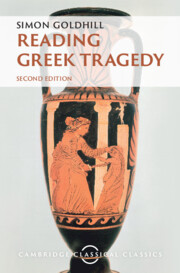Book contents
- Reading Greek Tragedy
- Cambridge Classical Classics
- Reading Greek Tragedy
- Copyright page
- Dedication
- Epigraph
- Contents
- Preface
- Preface to Second Printing
- Re-Reading Reading Greek Tragedy
- Chapter 1 The Drama of Logos
- Chapter 2 The Language of Appropriation
- Chapter 3 The City of Words
- Chapter 4 Relations and Relationships
- Chapter 5 Sexuality and Difference
- Chapter 6 Text and Tradition
- Chapter 7 Mind and Madness
- Chapter 8 Blindness and Insight
- Chapter 9 Sophistry, Philosophy, Rhetoric
- Chapter 10 Genre and Transgression
- Chapter 11 Performance and Performability
- Bibliography
- Index
Chapter 5 - Sexuality and Difference
Published online by Cambridge University Press: 19 October 2023
- Reading Greek Tragedy
- Cambridge Classical Classics
- Reading Greek Tragedy
- Copyright page
- Dedication
- Epigraph
- Contents
- Preface
- Preface to Second Printing
- Re-Reading Reading Greek Tragedy
- Chapter 1 The Drama of Logos
- Chapter 2 The Language of Appropriation
- Chapter 3 The City of Words
- Chapter 4 Relations and Relationships
- Chapter 5 Sexuality and Difference
- Chapter 6 Text and Tradition
- Chapter 7 Mind and Madness
- Chapter 8 Blindness and Insight
- Chapter 9 Sophistry, Philosophy, Rhetoric
- Chapter 10 Genre and Transgression
- Chapter 11 Performance and Performability
- Bibliography
- Index
Summary
Time and again the line of argument in my discussion has approached the question of sexuality, and has been forced to restrain itself. In the Oresteia, I argued, the relations between the sexes are an essential dynamic of the trilogy and any discussion of language, politics, imagery in that work is forced always to reconsider its siting in a sexual discourse. I attempted to show further that in any description of how the Greek city might try to delimit itself the polarized realms of a male world and female world were an essential, if difficult, marking of that not entirely physical topography. With regard to those primary words of human relations in the family and city, philos and ekhthros, the sexual was explicitly interwoven in the semantic range – and dislocations – of such terms. In this chapter, I wish to focus on this topic of sexuality, which is so important to Greek tragedy, and after I have looked at some of the complex problems involved in approaching this subject, I shall be considering in particular Euripides’ Hippolytus.
- Type
- Chapter
- Information
- Reading Greek Tragedy , pp. 147 - 179Publisher: Cambridge University PressPrint publication year: 2023

